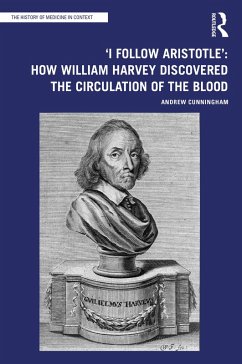
William Harvey and the Discovery of the Circulation of the Blood (eBook, ePUB)
Enriched edition. Unveiling the Revolutionary Legacy of Blood Circulation Discovery
Kommentar: Callahan, Troy / Redaktion: Good Press
Versandkostenfrei!
Sofort per Download lieferbar
1,99 €
inkl. MwSt.
Weitere Ausgaben:

PAYBACK Punkte
0 °P sammeln!
In "William Harvey and the Discovery of the Circulation of the Blood," Thomas Henry Huxley undertakes an incisive exploration of the pioneering work of William Harvey, whose groundbreaking revelations transformed the understanding of human anatomy and physiology in the early 17th century. Huxley's narrative deftly combines historical context with scientific analysis, employing a clear and engaging prose style that makes complex ideas accessible. He situates Harvey within the Renaissance's fervent spirit of inquiry, highlighting how Harvey's methodical experimentation and rejection of establish...
In "William Harvey and the Discovery of the Circulation of the Blood," Thomas Henry Huxley undertakes an incisive exploration of the pioneering work of William Harvey, whose groundbreaking revelations transformed the understanding of human anatomy and physiology in the early 17th century. Huxley's narrative deftly combines historical context with scientific analysis, employing a clear and engaging prose style that makes complex ideas accessible. He situates Harvey within the Renaissance's fervent spirit of inquiry, highlighting how Harvey's methodical experimentation and rejection of established norms led to the monumental discovery of the circulatory system 'Äì a pivotal moment in medical history. Thomas Henry Huxley, a prominent biologist and advocate for Darwinian evolution, was known for his commitment to scientific rigor and public discourse. His fascination with the foundations of biological science and medical education likely spurred him to write this account, as he sought to illuminate the empirical methods that underpin scientific progress. By revisiting Harvey's contributions, Huxley emphasizes the interplay between observation and theory, reflecting his own dedication to evidence-based understanding in the face of prevailing dogmas. This book is a must-read for anyone interested in the evolution of medical science and the historical figures who shaped it. Huxley's insightful analysis not only pays homage to Harvey's legacy but also invites readers to appreciate the critical importance of rigorous scientific inquiry. For scholars and enthusiasts alike, this compelling narrative serves as both an educational resource and a celebration of one of history's great scientific revolutions. In this enriched edition, we have carefully created added value for your reading experience: - A succinct Introduction situates the work's timeless appeal and themes. - The Synopsis outlines the central plot, highlighting key developments without spoiling critical twists. - A detailed Historical Context immerses you in the era's events and influences that shaped the writing. - An Author Biography reveals milestones in the author's life, illuminating the personal insights behind the text. - A thorough Analysis dissects symbols, motifs, and character arcs to unearth underlying meanings. - Reflection questions prompt you to engage personally with the work's messages, connecting them to modern life. - Hand-picked Memorable Quotes shine a spotlight on moments of literary brilliance. - Interactive footnotes clarify unusual references, historical allusions, and archaic phrases for an effortless, more informed read.
Dieser Download kann aus rechtlichen Gründen nur mit Rechnungsadresse in A, B, BG, CY, CZ, D, DK, EW, E, FIN, F, GR, H, IRL, I, LT, L, LR, M, NL, PL, P, R, S, SLO, SK ausgeliefert werden.













